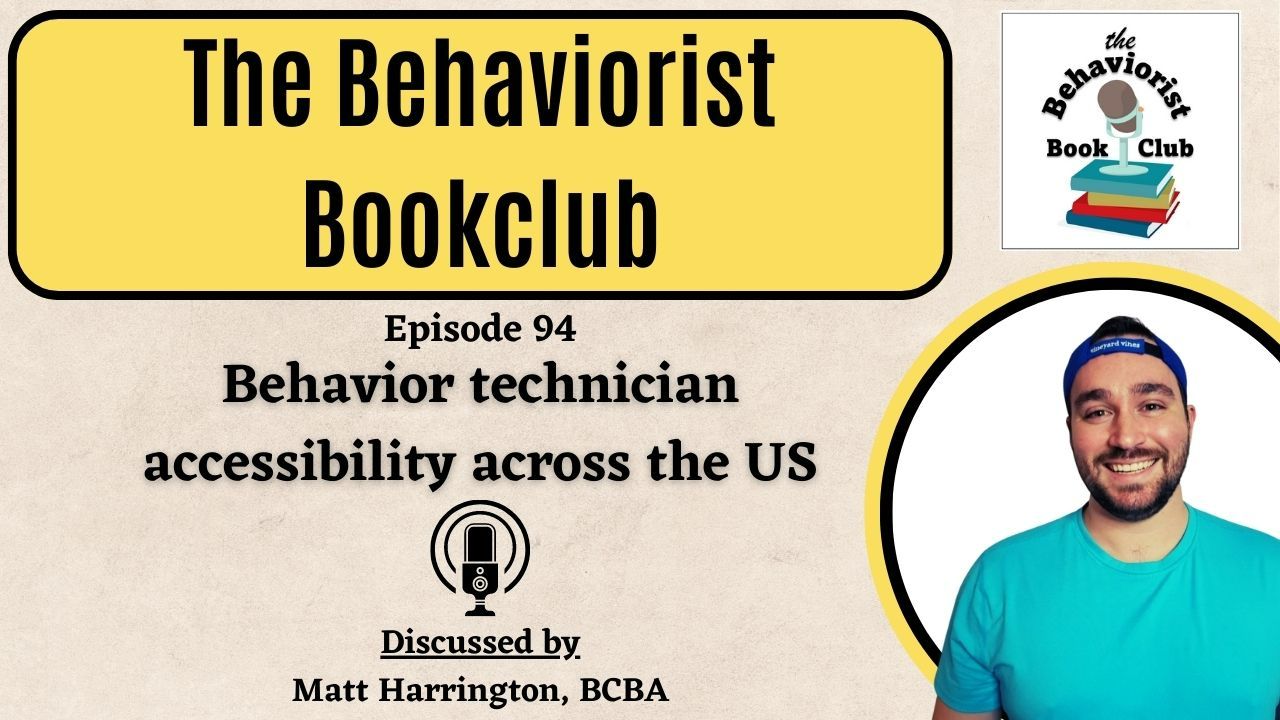Ep. 94- Behavior technician accessibility across the US
Sep 14, 2023
Resources mentioned in this episode
- Free 2 CEU course on Solving Clinical Challenges with Research- www.behavioristbookclub.com/solving
- Yingling et al., 2023- https://link.springer.com/article/10.1007/s40617-022-00729-1
Please contact Matt @ [email protected] if you have any questions or if you need help accessing the full article!
Full Transcript (Click for downloadable copy)
The following blog post was written by Chat GPT after providing the full transcript and requesting an accompanying blog post. For more information about why and how I use Chat GPT, please see this accompanying blog post -> Why I use Chat GPT for my Show Notes (behavioristbookclub.com)
The Struggle of Access to Behavior Analysis Services for Children with Autism
Let's dive into a thought-provoking study that sheds light struggle in ABA… Geographic access to registered behavior technicians (RBTs®) among children with autism spectrum disorder (ASD).
Welcome to the Behaviorist Book Club, where we explore the fascinating world of behavior analysis. I'm your host, Matt Harrington, and today, we're diving into a study titled "Geographic Access to Registered Behavior Technicians Among Children with Autism Spectrum Disorder" by Marissa Yingling and colleagues. This study, published in Behavior Analysis in Practice, offers valuable insights into the distribution of behavior analysis services across different areas and its implications.
The Roles of BCBA ®, RBT ®, and Accessibility
In the field of behavior analysis, different credentials play key roles in delivering effective interventions to children with autism. We have the Board Certified Behavior Analyst (BCBA®), the BCBA-D® (doctorate designation), and the Registered Behavior Technician (RBT®). These individuals collaborate to provide comprehensive behavior analysis services, but the accessibility of RBTs® can greatly influence the outcomes.
The study reveals intriguing statistics. There are approximately 50,000 BCBAs® and BCBA-Ds®, with half of them obtaining their credentials within the first five years. This emphasizes the relatively young age of our field in terms of supervisory experience. Experience is a powerful teacher, and as the field matures, we can expect more nuanced discussions and solutions to complex challenges.
Now, here's the twist: there are 100,000 RBT® certificates, and becoming an RBT® is relatively straightforward—a 40-hour training, competency exam, high school diploma, and written exam. RBTs® provide the bulk of one-on-one behavior analysis services, while BCBAs® handle supervisory responsibilities and programming. The availability of RBTs® directly affects the accessibility and nature of behavior analysis services.
Unveiling the Challenges and Solutions
Why is RBT® accessibility so crucial? Let's explore two vital reasons:
- Service Delivery Requirements: Many evidence-based practices rely on substantial amounts of intervention time, often beyond just a couple of hours a week. With the majority of services delivered by RBTs®, their availability directly impacts the effectiveness of these practices. The absence of RBTs® can necessitate modifications to maintain evidence-based practices.
- Supervisor Skill Set: The study underscores how behavior technicians often transition to become behavior analysts. However, these supervisors-to-be have predominantly practiced with RBT® support. If they were to operate independently as behavior analysts, they might lack the necessary skill set. This highlights the importance of RBT® accessibility in shaping the future generation of behavior analysts.
Mapping the Puzzle: Challenges and Opportunities
The study dives into county-level data, mapping the presence of RBTs® and BCBAs®, as well as autism prevalence. Interestingly, the distribution follows familiar patterns: higher activity along the coasts and less concentration in the center of the country. A striking discovery is the presence of behavior technicians still practicing in areas without another behavior analyst, possibly indicating a need for remote support or a potential lack of supervision.
Telehealth: An Expansive Solution with Its Own Challenges
Telehealth, an emerging avenue in behavior analysis, offers intriguing possibilities. It allows behavior analysts to provide services remotely, potentially increasing accessibility. However, it comes with its own set of challenges. While telehealth can be as effective as in-person sessions, building relationships with clients and caregivers can be more challenging. The study calls for more research on best practices for telehealth supervision to ensure high-quality services.
The Independent Behaviorist Role: A Shift in Perspective
Another avenue explored is the independent behaviorist role, where behavior analysts provide services directly without RBT® support. This concept challenges the conventional model and mirrors practices in other fields like speech-language pathology and occupational therapy. It prompts us to ponder whether we could achieve meaningful outcomes with fewer hours of direct therapy by focusing on caregiver training and interventions in the client's natural environment.
A Thought to Ponder: What if…
As we conclude this journey through the world of behavior analysis, let's return to our puzzle analogy. The pieces of this puzzle are in constant motion, with each discovery shaping a brighter future for children with autism. What if we continue to explore innovative ways to ensure RBT® accessibility, leverage the potential of telehealth, and rethink the roles of behavior analysts and RBTs®? What if we uncover the missing pieces that can create a more comprehensive and impactful picture?
This study serves as a reminder that every piece matters, and by examining the puzzle from different angles, we can create a more inclusive, effective, and dynamic field of behavior analysis.
Thank you for joining us at the Behaviorist Book Club. Until next time, keep exploring, keep learning, and keep building a better future for individuals with autism and their families.
Solve your clinical challenges with research using this simple, 3 step process that saves you time and gets you clinical answers FAST.
Learn the Key Places Framework, the Research Finding Framework, and how they work together in this free minicourse.
Signing up will also subscribe you to the email list. Unsubscribe at anytime! We will never sell your information, for any reason.

